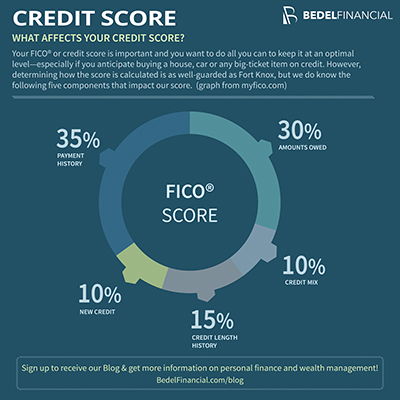FICO Credit-Scoring System
The FICO® (Fair Isaac Corporation) is the most widely used system for determining credit scores. FICO scores range between 300 and 850 points, depending on how well you handle your credit. Sixty-six percent of Americans have a good FICO Score (rating of 670-739) or better (rating of 740-850). Are you one of them?

FICO scoring is used in about ten billion financial decisions worldwide every year. Ironically, the calculations used to determine a score continues to remain a secret. Some information FICO does share is the five components that impact each score and the weight of each:
- Payment History (35%)
- Credit Utilization (30%)
- Length of Credit History (15%)
- New Credit (10%)
- Credit Mix (10%)
An interesting tidbit: If you have a high credit score, the factors that negatively impact your credit will hit you harder than those who have a lower score. For example, if your credit score is 780 and you are 30 days or more past due in paying a bill, your score will drop 90 to 100 points. Someone with a score of 680 may only see their credit score drop between 60 and 90 points.
What Negatively Impacts Your Credit Score
Here are a few actions that we know will negatively impact your credit score:
Late or missed payments. Whether it’s your credit card, utility bill, mortgage or auto loan, the biggest concern for a potential lender is whether you are timely with your payments. Your most recent payment history will have the most impact on your credit score.
Maxing your available credit. Experts say you should keep your borrowing to 75 percent or less of the amount you are eligible to use. For example, if your credit card has a credit limit of $5,000, your outstanding balance should never exceed $3,750. The more credit cards you’ve maxed out, the lower your credit rating will be.
Requests for additional credit. Each time you apply for a credit card, any type of loan, or a line of credit the finance company will access your credit report. (This is called a “hard inquiry.”) When your credit report is checked frequently by potential lenders, it negatively impacts your credit score. If you find those 0 percent interest offers at department stores appealing, be sensible as to when and how often you apply for them. Each time you take advantage of one of these offers, you are opening a new credit line and your credit report will be checked.
Lien or foreclosure. A vendor placing a lien against your home or foreclosure by a bank could impact your credit score by as much as 160 points. If you’re unable to meet a payment schedule, attempt to modify it before it gets to this point and adversely affects your credit score.
Bankruptcy. You do the most serious damage to a credit score when you file for bankruptcy. This can lower your score by as much as 240 points. And, it takes seven to ten years to remove bankruptcy from your credit report!
Unemployment. Unemployment itself will not affect your credit score, nor will losing your job. However, being unemployed for an extended period of time could lead to financial instability, increased debt, and payment defaults. Any of these could ultimately impact your credit score.
What Doesn’t Impact Your Credit Score
As you work to maintain a strong credit score, it’s just as important to know the factors that generally have no impact at all. These factors include: your income and personal assets, marital status, demographics, and interest rates on existing loans. In addition, “soft inquiries” such as preapproved credit card offers or checking your own credit score, have no impact.
Summary
If your FICO score is good, proceed to the “start line” with caution this month to keep that engine roaring into June. If you have room for improvement, there’s no time like the present to take a pit stop and develop a strategy for finishing in the top two-thirds of the pack. And remember, you won’t get a “dent” for keeping your eye on the road!
Schedule a Consultation
We have helped our clients answer these questions and more. If you want a clear understanding of your financial future, and need help making changes to reach your goals, schedule a consultation and we can get started.
Recommended Articles
Tough Time to Find Used Cars: Indiana has Best Value
Used vehicle price increases are frustrating to consumers...





